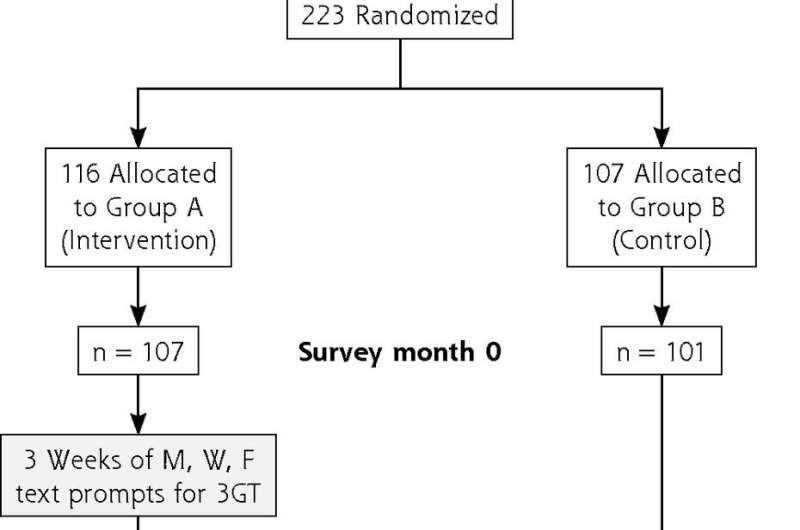This article has been reviewed according to Science X's editorial process and policies. Editors have highlighted the following attributes while ensuring the content's credibility:
fact-checked
peer-reviewed publication
trusted source
proofread
Gratitude practice among health care workers shows positive effects on well-being, with limitations

Researchers tested a digital version of a positive psychology intervention called "Three Good Things" (3GT) among health care workers to assess whether gratitude practice improved well-being.
Two hundred and twenty-three participants—all of whom were based at a single, large academic medicine department—were randomized to an immediate intervention or delayed intervention control group. During the study, participants received text messages three times per week, prompting them to document three things for which they were grateful.
Participants completed surveys measuring levels of depression, positive affect, gratitude, and life satisfaction at the study's launch and then one month and three months post-intervention. Control group participants completed additional measures at months four and six after completing the delayed intervention. They used linear mixed models to compare intervention and control groups and to look at the effects of department role, gender, age, and time on outcomes.
The intervention group and control group showed no significant differences in depression, gratitude, or satisfaction with life scores at months 0, 1, or 3. For depression and gratitude, scores in the intervention group were favorable immediately after the intervention but gains had been mostly lost by month 3 and were not significant.
Measures of positive affect were significantly different between groups over time, particularly in the first month when the intervention group had more than a two-point jump in scores (versus 0.25 jump for the control group) that was statistically significant at the 0.05 level. However, gains had mostly disappeared by month 3. There were no differences in self-reported mental and physical health ratings between groups.
What we know:
Physicians, nurses and other health care professionals have experienced increasing rates of mental distress and burnout, which have been exacerbated by the COVID-19 pandemic. Research on high-quality interventions is limited. However, researchers hypothesized that individual interventions, such as the gratitude intervention "Three Good Things," (3GT) may help alleviate emotional burden and improve well-being among health care professionals.
What this study adds:
While the 3GT intervention showed initial improvement in well-being among participants directly after the intervention began, sustaining those feelings of well-being proved elusive in the longer term.
The paper is published in The Annals of Family Medicine journal.
More information: Katherine J. Gold et al, "Three Good Things" Digital Intervention Among Health Care Workers: A Randomized Controlled Trial, The Annals of Family Medicine (2023). DOI: 10.1370/afm.2963




















